High-Profile Killings by Police
Were you or a loved one a victim of police brutality?
Attorneys that work with Police Brutality Center may be able to assist you.
"*" indicates required fields
Content Last Updated: May 2, 2025
Few things are more tragic than the loss of innocent lives at the hands of those who are supposed to protect and serve. Despite heightened activism and public outcry, police killings of civilians—especially people of color—are on the rise.
In 2023, police shot and killed 1,160 people, up from 1,097 in 2022, according to Statista. The numbers have steadily risen since 2017, when 987 people lost their lives in police shootings. While civilians of all races have been victims of police brutality, police continue to shoot and kill Black Americans at a higher rate than white people. As of February 2024, the rate of Black fatal shootings was 5.9 per million of the population per year, compared to 2.3 per million for white people.
These statistics only cover shootings and don’t include those killed by police in other ways. According to Mapping Police Violence, a leading police violence research project, police killed at least 1,352 people in 2023.
These aren’t just numbers—every single incident involves a life lost, a family shattered, and a community changed forever. The following high-profile killings represent only a fraction of the many tragedies that have resulted from police brutality in recent years.

“Daunte Wright Protest at GAP” by Andrew Ratto is licensed under CC-BY-2.0.
Daunte Wright
Minnesota police officer Kim Potter shot Daunte Wright, a Black American man, during a traffic stop in April 2021. Potter initially stopped Wright for expired registration tags but, in the process, discovered an outstanding warrant for his arrest. When Potter and other officers tried to detain him, a struggle ensued, and he stepped back into his car, the New York Times says. Video footage showed that one officer pointed a handgun at him and shouted, “Taser.” The Times reported that she then shouted obscenities and said she had just shot him.
At Potter’s trial, the prosecution and defense agreed that the shooting was a mistake. A jury convicted Potter, a white woman, of first and second-degree manslaughter. A judge sentenced her to two years in prison.
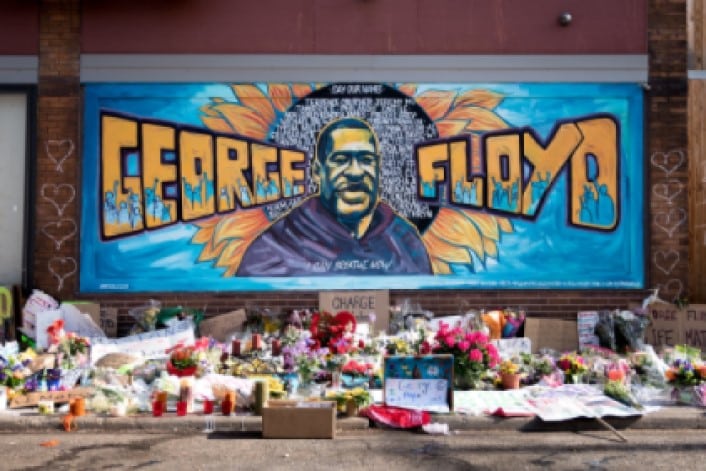
“George Floyd mural outside Cup Foods” by Lorie Shaull is licensed under CC-BY-2.0.
George Floyd
A jury convicted former Minneapolis police officer Derek Chauvin of second and third-degree murder and manslaughter charges for killing George Floyd, a Black American. According to ABC News, Chauvin pressed his knee on Floyd’s neck, despite Floyd’s cries that he couldn’t breathe. Chauvin’s knee was on Floyd’s neck for more than nine minutes.
A bystander’s video of the incident went viral. The Minneapolis Police Department also fired three other officers involved in the 2020 incident. The officers responded to a call from a store manager that said Floyd had paid for a purchase with a counterfeit $20 bill.
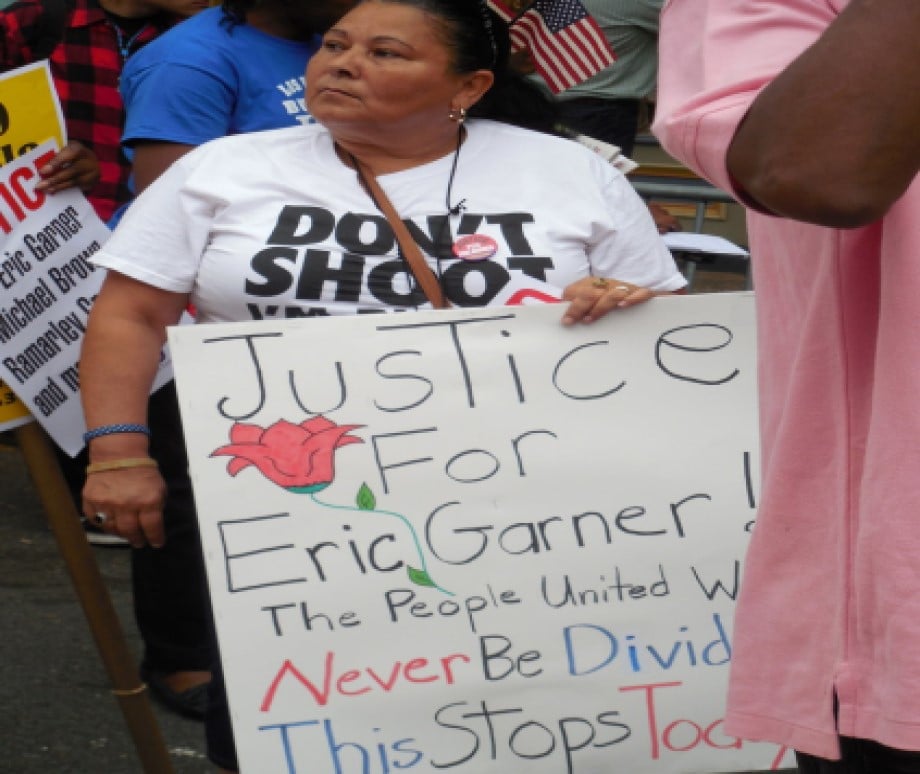
“Rev. Al Sharpton Leads March, Rally Over Eric Garner’s Death” by Gerard Flynn is licensed under CC-BY-2.0.
Eric Garner
A New York City police officer put Eric Garner in a chokehold when Garner refused to be handcuffed for allegedly selling untaxed cigarettes in 2014. Garner was a Black American father of six. A Staten Island grand jury did not indict Officer Daniel Pantaleo, nor did the Justice Department file any charges in the incident.
Another officer was also involved in the incident. Garner told officers he couldn’t breathe during the encounter, and a medical examiner ruled his death a homicide by suffocation, according to History.com.
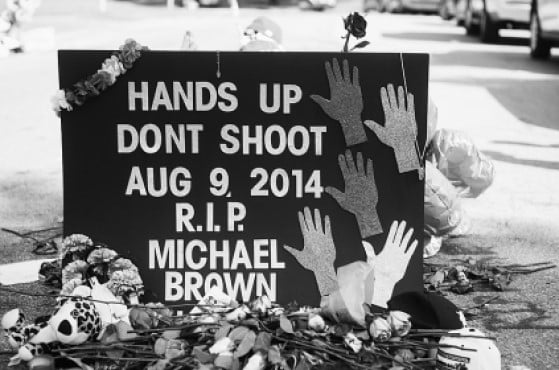
“Memorial to Michael Brown” by Jamelle Bouie is licensed under CC-BY-2.0.
Michael Brown
Darren Wilson, a police officer in Ferguson, Missouri, fatally shot Michael Brown, a Black man, in 2014. The death touched off weeks of protests. A St. Louis grand jury did not indict Wilson, nor did the Justice Department charge him.
Brown was with a friend, Dorian Johnson. Wilson said Brown attacked him and his police vehicle. However, Johnson said that Wilson initiated the confrontation by grabbing Brown by the neck through the car’s window. Wilson allegedly fired 12 bullets in the altercation.
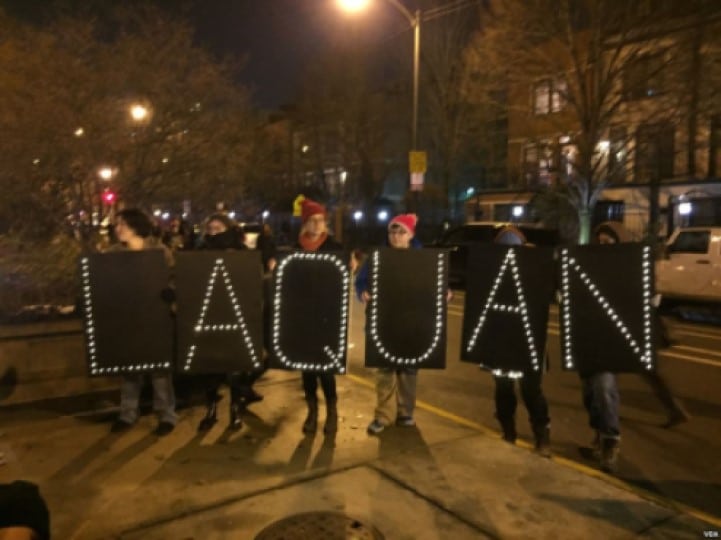
Laquan McDonald
Chicago police officer Jason Van Dyke shot and killed Laquan McDonald, a Black man, as he walked away from him in 2014. Van Dyke fired 16 times at McDonald. The city released a dashcam video of the shooting, and prosecutors charged Van Dyke with first-degree murder. A jury convicted him of second-degree murder and 16 counts of aggravated battery with a firearm. He was sentenced to nearly seven years in prison, according to CNN.
An inspector general’s report of the incident said McDonald never advanced toward Van Dyke and his partner, as Van Dyke had initially claimed. The report also said that an on-duty commanding officer approved false statements in an attempt to cover up the incident, CNN notes.
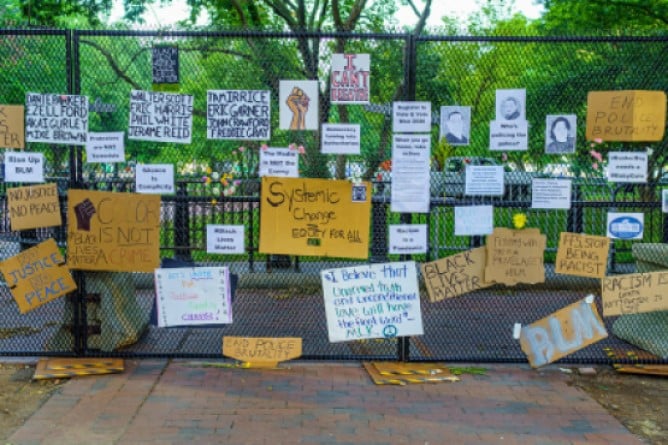
“Black Lives Matter Plaza, Washington, DC USA” by Ted Eytan is licensed under CC BY-SA 2.0.
Tamir Rice
In 2014, a Cleveland police officer shot Tamir Rice, a-12-year-old Black youth with a pellet gun tucked in his waistband. According to ABC News, the police were responding to a 911 call from a man drinking beer and waiting for a bus who said a “guy” was pointing a gun at people.
Timothy Lohmann fired the fatal shot. Frank Garmback, training officer, accompanied Lohmann on the call. A grand jury and the Department of Justice declined to indict Lohmann, saying the video’s quality was too poor.
Walter Scott
Michael Slager, a North Charleston, S.C. police officer, shot unarmed Walter Scott in the back as Scott fled after a 2015 traffic stop. Walter Scott was a Black man. The shooting also set off a wave of national protests. Prosecutors charged Slager with murder. A 2016 trial was declared a mistrial after the jury deadlocked; however, in 2017, Slager pleaded guilty in federal court to violating Scott’s civil rights. As part of the plea deal, prosecutors dropped the murder charge.
A judge, saying Slager acted with malice, sentenced him to 20 years, plus two years of supervised probation after his release. Federal prosecutors had sought life in prison, according to NBC News. Slager is appealing the sentence.
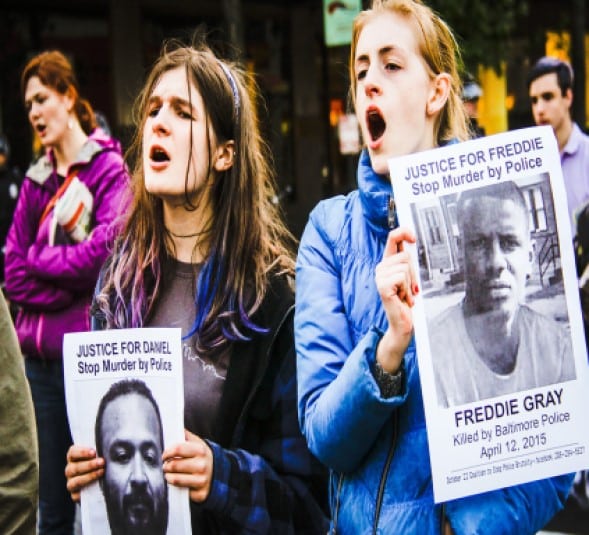
“Freddie Gray Protest Seattle 2015” by Scott Lum is licensed under CC BY-NC 2.0.
Freddie Gray
Freddie Gray, a Black man, died due to a spinal injury he sustained while handcuffed and shackled in a Baltimore police van. According to Rolling Stone, his spinal cord was nearly severed in the van. Police had arrested Gray for allegedly possessing a switchblade. A citizen’s video of the arrest showed Gray screaming in pain. The citizen circulated the video widely, and it sparked protests against police brutality in Baltimore.
Prosecutors charged six Baltimore police officers with criminal offenses, but the first three to be tried were acquitted. Prosecutors subsequently dropped the remaining cases. The Department of Justice declined to bring charges, saying the evidence was insufficient. A Rolling Stone investigation after the incident revealed the knife in question was an assisted opener rather than a switchblade. An assisted opener is legal under Maryland law.
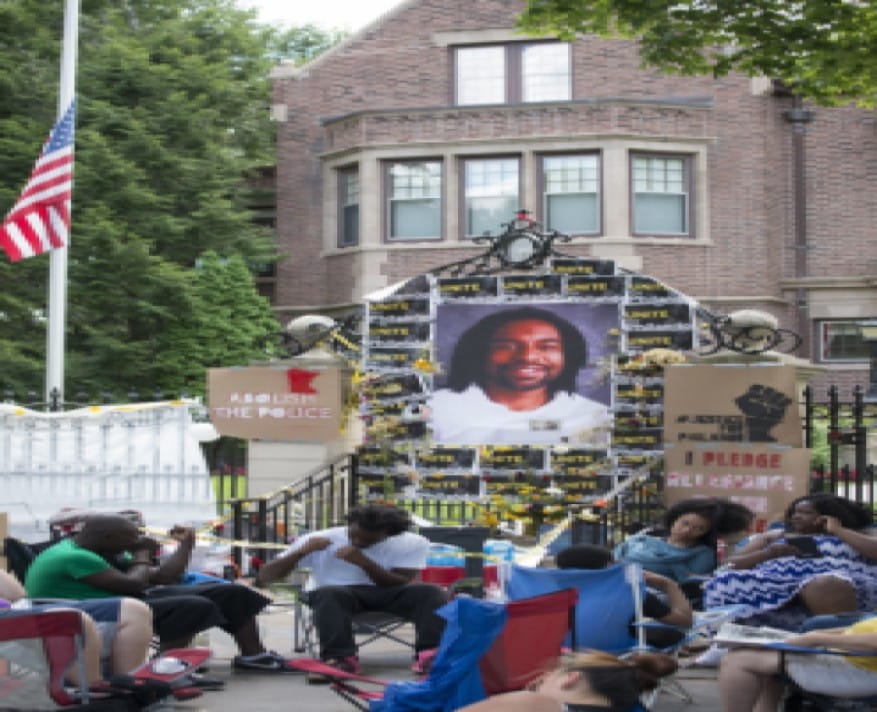
“Philando Castile memorial at the gate of the Minnesota Governor’s Mansion” by Fibonacci Blue is licensed under CC-BY-2.0.
Philando Castile
Jeronimo Yanez, a St. Anthony, Minnesota police officer, shot Philando Castile five times during a 2016 traffic stop after Castile informed the officer that he was armed. Castile was a Black elementary school cafeteria worker. Castile’s girlfriend, who was in the car with her 4-year-old daughter, live-streamed the shooting’s aftermath on Facebook.
Prosecutors charged Yanez with second-degree manslaughter. At the trial, Yanez testified that Castile was pulling his gun out of his pocket, and the jury acquitted him, according to The New York Times. Castile’s girlfriend said he was only reaching for his identification.
Justine Ruszczyk Damond
Minneapolis Police Officer Mohamed Noor shot and killed Justine Ruszczyk Damond in 2017 when she approached his squad car in the alley behind her home. Damond, a white dual U.S.-Australian citizen, had just called 911 earlier to report a possible sexual assault. She was a life coach and was engaged to be married.
Prosecutors charged Noor with second-degree murder. According to NBC, at the trial, Noor testified that he heard a loud bang on the driver’s side of the squad car and thought Damond was a threat. Noor said he shot to protect his partner’s life. A jury convicted Noor of a lesser charge of third-degree murder and second-degree manslaughter. Noor, a Somali immigrant, is serving a 12 and a half year sentence.
Jordan Edwards
Jordan Edwards, a Black 15-year-old boy, was killed by police officer Roy Oliver in Balch Springs, Texas in 2017. Edwards and several of his friends were leaving a house party when Oliver fired his patrol rifle at their car, with one of the bullets striking Edwards in the head and killing him.
Oliver was charged with murder as well as aggravated assault, though the jury only found him guilty of the murder charge, and in 2018 sentenced him to 15 years in prison and a fine of $10,000. Still, this was considered a historic victory, and in April 2023 Edwards’ family was also awarded millions of dollars in lawsuit against Oliver.
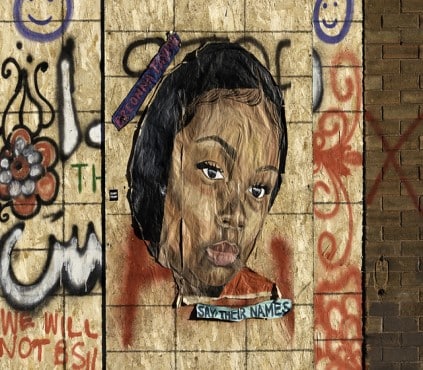
“Breonna Taylor street art on plywood near the George Floyd Memorial” by Lorie Shaull is licensed under CC-BY-2.0.
Breonna Taylor
Breonna Taylor, a Black American emergency medical worker, died when three narcotics detectives broke the door of her Louisville, Kentucky, apartment and burst in during the middle of the night. Police entered the apartment with a no-knock warrant in a raid that was poorly planned and executed, according to a New York Times investigation.
Taylor and her boyfriend, Kenneth Walker, were asleep at the time of the raid. When police burst in, Walker fired one shot from his legally owned gun, saying he thought they were intruders. His shot wounded Sgt. Jonathan Mattingly in the leg. The officers returned fire with 32 shots. Neither Taylor nor Walker had a criminal record, and detectives found no drugs in the apartment. The detectives had obtained the warrant as part of an investigation of Taylor’s former boyfriend, History.com says.
Louisville officials agreed to pay a $12 million death claim to Taylor’s relatives. They also agreed to institute reforms to prevent similar deaths as part of the settlement. Prosecutors did not charge any of the officers in Taylor’s death. The Times said that a grand jury indicted former Detective Brett Hankison with wanton endangerment of Taylor’s neighbors when he fired without clear sightlines. A jury acquitted Hankison. The city fired all three detectives involved in the raid, although the Kentucky Attorney General said the other two detectives were justified in returning fire.
Subsequently, Louisville banned no-knock warrants in response to protests from civil rights activists and celebrities, History.com says.
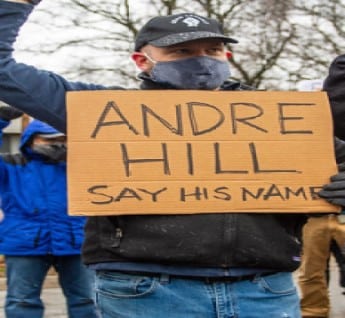
“03IMG_7321” by Becker1999 is licensed under CC-BY-2.0.
Andre Hill
Columbus, Ohio, police officer Adam Coy shot Andre Hill, an unarmed Black American man, in December 2020. Coy and his partner went to the scene because a caller had reported a car repeatedly turning on and off. Coy had a conversation with Hill at the scene. Later, Hill emerged from the garage holding an illuminated cell phone in his left hand, and Coy shot him, the Columbus Dispatch says. Coy says he thought the keys that Hill was holding in his right hand were a revolver. Hill was unarmed.
Coy was fired and charged with murder and felonious assault. Initially scheduled for March 2022, his trial has been postponed until November because Coy has scheduled hip replacement surgery, NBC 4 says.
Fanta Bility
Fanta Bility, an eight-year-old girl, died when Sharon Hill, Pennsylvania police fired into a crowd as they were leaving a high school football game in August 2021. The officers fired in response to shots fired by two teens at the event near Philadelphia. Prosecutors have charged the two teens with first-degree murder in Bility’s death, according to ABC 6. A former Philadelphia District Attorney is conducting a review of police procedures in the incident.
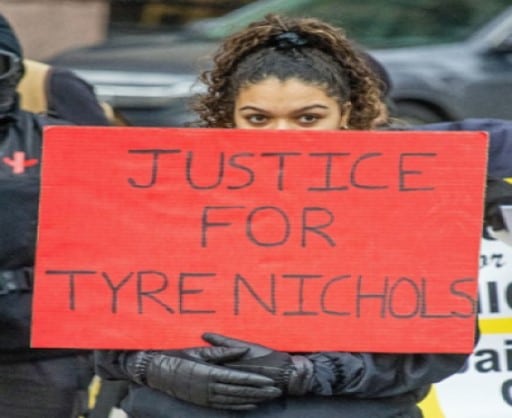
“IMG_6128” by Becker1999 is licensed under CC-BY-2.0.
Tyre Nichols
Tyre Nichols, a 29-year-old Black man, died in January 2023 after five police officers beat him repeatedly during a traffic stop in Memphis, Tennessee. The officers—Tadarrius Bean, Demetrius Haley, Emmitt Martin III, Desmond Mills Jr., and Justin Smith—spent roughly three minutes beating Nichols with batons, kicking him while he was on the ground, and using pepper spray and a stun gun on him. Nichols died in the hospital three days later from extensive bleeding.
Officials claimed that Nichols had fled when the officers initially approached him. However, body cam footage shows Nichols did not originally run from the officers. The Memphis Police Department fired the officers who were involved in his death. They later faced state and federal charges for second-degree murder, civil rights violations, and several other offenses.
Patrick Lyoya
Patrick Lyoya, a 26-year-old Black man, died in April 2022 when police officer Christopher Schurr shot him during a traffic stop in southeast Grand Rapids, Michigan. Lyoya was intoxicated but unarmed at the time of the incident. He tried to flee the scene, resulting in a physical altercation between him and the officer.
It was during this struggle that Schurr fired a single gunshot into the back of Lyoya’s head. Lyoya died at the scene. Schurr was charged with second-degree murder and lost his job shortly after the charge was announced.
Keenan Anderson
Keenan Anderson died in January 2023 after a group of Los Angeles police officers tased him repeatedly. Anderson, a Black man, was 31 years old and the father of a six-year-old boy. He had been visiting family in Los Angeles from Washington, D.C., when police stopped him on suspicion of causing a hit-and-run. Anderson fled the stop, resulting in a struggle between him and five police officers. According to published reports, officers Joshua Coombs, Stephen Feldman, Christopher Walters, Rasheen Ford, and Jaime Fuentes allegedly pinned him to the street, pressed on his windpipe, and used a stun gun on him six times.
Anderson went into cardiac arrest and died at the hospital four hours after the incident. Although the coroner and an independent autopsy found that Anderson died of an enlarged heart and cocaine use, some authorities argue that the tasing contributed to his death. His family filed a wrongful death lawsuit against the police and the city.
Darryl Tyree Williams
In January 2023, 32-year-old Darryl Tyree Williams died after a violent altercation with six police officers in Raleigh, North Carolina. The police had been trying to arrest Williams, a Black man, for possession of a controlled substance after finding a folded dollar bill with white powder in his pocket. Williams tried to flee, which prompted the officers to stun him with a Taser three times. According to footage of the incident, Williams had warned the officers that he had a heart condition before they stunned him for the final time.
Williams’ autopsy report declared his death a homicide, citing the cause of death as sudden cardiac arrest resulting from cocaine intoxication and the police encounter. The department placed the officers on administrative leave. A local prosecutor decided not to seek criminal charges against the officers, arguing that evidence failed to show unreasonable use of force.

